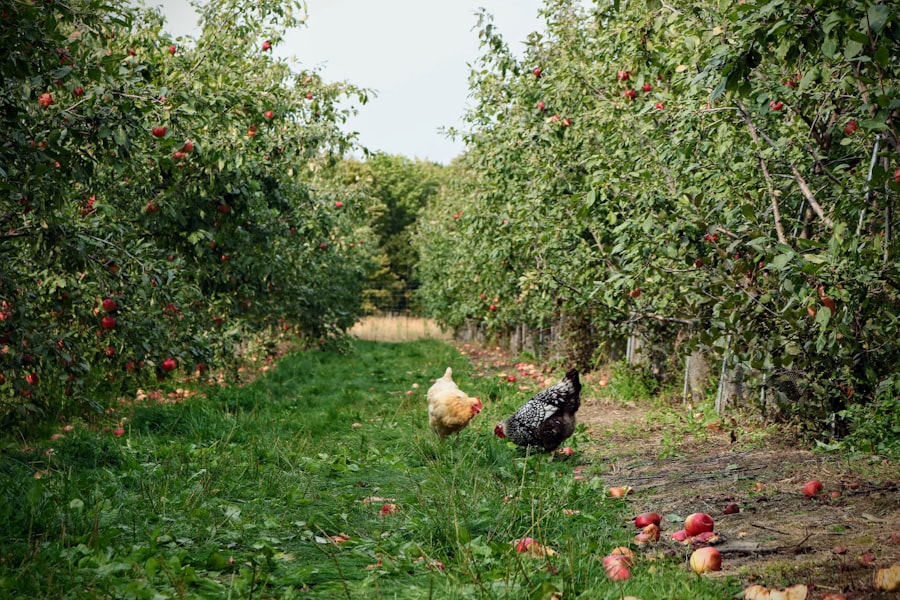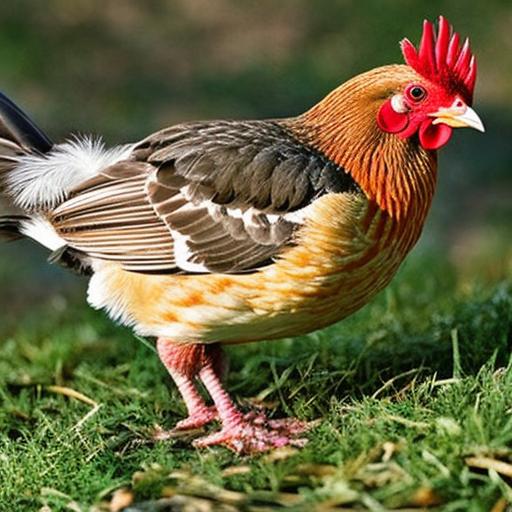Keeping chickens has become increasingly popular in recent years, as more people are recognizing the benefits of raising their own food and embracing a sustainable lifestyle. Chickens provide a self-sufficient food source, reduce waste, and offer a range of other benefits. In this article, we will explore the rise of chicken-keeping in America, the benefits of keeping chickens, the role of propaganda in promoting chicken-keeping, the design and construction of a chicken coop, choosing the right breeds for your flock, feeding and caring for your chickens, health and safety considerations, and the economic benefits of keeping chickens.
Key Takeaways
- Keeping chickens can lead to a sustainable and self-sufficient lifestyle.
- Chicken-keeping has risen in popularity in America.
- Propaganda has played a role in promoting chicken-keeping.
- Proper design and construction of a chicken coop is important.
- Feeding and caring for chickens requires attention to health and safety considerations.
The Rise of Chicken-Keeping in America
Chicken-keeping has a long history in America, dating back to colonial times when chickens were kept primarily for their eggs. However, in recent years, there has been a significant increase in the number of people keeping chickens. This rise in popularity can be attributed to several factors. Firstly, there is a growing interest in sustainable living and self-sufficiency. People are becoming more conscious of where their food comes from and are seeking ways to reduce their reliance on industrial agriculture. Keeping chickens allows individuals to have control over their food source and ensures that they are consuming fresh, organic eggs.
According to statistics, the number of households keeping chickens has increased by 400% since 2004. This surge in popularity can also be attributed to the rise of urban farming and backyard homesteading movements. Many cities have relaxed regulations on keeping chickens, allowing more people to have them in their backyard. Additionally, social media platforms have played a significant role in promoting chicken-keeping. People share their experiences and knowledge online, inspiring others to start their own flocks.
The Benefits of Keeping Chickens: A Sustainable and Self-Sufficient Lifestyle
Keeping chickens offers numerous benefits for individuals and communities alike. One of the most significant advantages is the ability to live a more sustainable lifestyle. Chickens are efficient converters of food scraps and garden waste into high-quality fertilizer. By feeding them kitchen scraps and allowing them to forage in the yard, you can significantly reduce your household waste. Additionally, chickens produce nutrient-rich manure that can be used to fertilize your garden, reducing the need for synthetic fertilizers.
Furthermore, keeping chickens provides a self-sufficient food source. Chickens lay eggs, which are a nutritious and versatile food. By having your own flock, you can ensure that you have a constant supply of fresh eggs. This not only saves you money but also allows you to have complete control over the quality of the eggs you consume. You can ensure that your chickens are raised in a humane and healthy environment, resulting in eggs that are free from antibiotics and hormones.
The Role of Propaganda in Promoting Chicken-Keeping
Propaganda has played a significant role in promoting chicken-keeping throughout history. During World War I and II, propaganda campaigns encouraged people to keep chickens as a way to support the war effort. Posters and advertisements depicted chickens as patriotic symbols and emphasized their role in providing food security for the nation. These campaigns were successful in mobilizing communities and increasing the number of backyard flocks.
While propaganda can be used for positive purposes, it can also have negative effects. In recent years, there has been an increase in misinformation about chicken-keeping spread through social media platforms. Some individuals promote backyard chicken-keeping without providing accurate information about the responsibilities and challenges involved. This can lead to inexperienced individuals taking on more than they can handle or neglecting the welfare of their chickens. It is essential to approach chicken-keeping with realistic expectations and seek reliable sources of information.
The Chicken Coop: Design and Construction
Having a well-designed chicken coop is crucial for the health and safety of your flock. The coop should provide protection from predators, shelter from the elements, and adequate space for the chickens to move around. When designing and constructing a chicken coop, there are several factors to consider.
Firstly, the size of the coop should be appropriate for the number of chickens you plan to keep. Each chicken should have at least 4 square feet of indoor space and 10 square feet of outdoor space. It is important to provide enough room for the chickens to move around comfortably and engage in natural behaviors such as scratching and dust bathing.
The location of the coop is also important. It should be placed in an area that is well-drained and receives adequate sunlight. The coop should be elevated off the ground to prevent moisture buildup and discourage pests. Additionally, it is essential to provide proper ventilation to ensure good air quality inside the coop.
Choosing the Right Breeds for Your Chicken Coop

There are hundreds of different chicken breeds available, each with its own characteristics and qualities. When choosing breeds for your chicken coop, it is important to consider factors such as egg production, temperament, and climate adaptability.
If your primary goal is egg production, you may want to consider breeds known for their high egg-laying capabilities, such as Leghorns or Rhode Island Reds. These breeds are known for their consistent egg production and can provide you with a steady supply of eggs.
Temperament is another important factor to consider when choosing breeds. Some breeds are more docile and friendly, while others can be more aggressive or flighty. If you have children or plan to interact with your chickens frequently, you may want to choose breeds known for their friendly disposition, such as Silkies or Orpingtons.
Lastly, it is important to choose breeds that are well-suited to your climate. Some breeds are more cold-hardy and can tolerate harsh winters, while others are better suited for warmer climates. Researching the specific needs and characteristics of different breeds will help you make an informed decision.
Feeding and Caring for Your Chickens: Tips and Tricks
Feeding and caring for your chickens properly is essential for their health and well-being. Chickens require a balanced diet that includes a combination of commercial feed, kitchen scraps, and foraged food. Commercial feed should make up the majority of their diet and should be specifically formulated for chickens. It is important to choose a feed that is appropriate for the age and purpose of your chickens, whether they are laying hens or meat birds.
In addition to commercial feed, chickens can also be fed kitchen scraps such as vegetable peels, fruit scraps, and bread. However, it is important to avoid feeding them anything toxic or harmful, such as chocolate, onions, or avocado. Foraged food, such as insects and grass, can also be an important part of their diet. Allowing your chickens to free-range in a safe area can provide them with additional nutrition and mental stimulation.
Caring for your chickens involves providing them with clean water, regular health checks, and a clean living environment. Chickens should have access to fresh water at all times, and their water containers should be cleaned regularly to prevent the growth of bacteria. Regular health checks involve monitoring their behavior, checking for signs of illness or injury, and providing appropriate veterinary care when needed. The coop should be cleaned regularly to prevent the buildup of waste and parasites.
Health and Safety Considerations for Your Flock
Keeping your flock healthy and safe is essential for their well-being. There are several common health issues that can affect chickens, including respiratory infections, parasites, and nutritional deficiencies. It is important to be aware of these issues and take preventive measures to keep your flock healthy.
Respiratory infections are common in chickens and can be caused by bacteria or viruses. Good ventilation in the coop is essential to prevent the buildup of moisture and ammonia, which can contribute to respiratory problems. Regular cleaning of the coop and providing a clean living environment can also help prevent the spread of disease.
Parasites, such as mites and lice, can also affect chickens. Regularly inspecting your chickens for signs of parasites and treating them promptly can help prevent infestations. There are several products available for treating parasites, including powders, sprays, and dust baths.
In addition to health considerations, it is important to keep your flock safe from predators and extreme weather conditions. Chickens are vulnerable to predators such as raccoons, foxes, and hawks. Providing secure fencing and a predator-proof coop can help protect your flock. Additionally, extreme weather conditions such as heatwaves or cold snaps can be dangerous for chickens. Providing shade and shelter from the elements is essential to keep them safe.
The Economic Benefits of Keeping Chickens: Saving Money and Making a Profit
Keeping chickens can have significant economic benefits. Firstly, it can save you money on grocery bills. By producing your own eggs, you can reduce your reliance on store-bought eggs, which can be expensive, especially if you prefer organic or free-range options. Additionally, chickens can help reduce food waste by consuming kitchen scraps that would otherwise end up in the trash.
Furthermore, keeping chickens can also be a source of income. If you have a surplus of eggs, you can sell them to friends, neighbors, or local markets. Many people are willing to pay a premium for fresh, organic eggs produced by backyard flocks. Additionally, if you have the space and resources, you can raise meat birds and sell them for profit.
Lastly, keeping chickens can also help reduce food waste on a larger scale. By feeding them kitchen scraps and garden waste, you are diverting organic material from landfills and contributing to a more sustainable food system.
Joining the Chicken-Keeping Community and Embracing a Sustainable Lifestyle
In conclusion, keeping chickens offers numerous benefits, both for individuals and communities. It allows you to live a more sustainable lifestyle by providing a self-sufficient food source, reducing waste, and contributing to a more sustainable food system. By joining the chicken-keeping community, you can connect with like-minded individuals, share knowledge and experiences, and contribute to the growing movement towards sustainable living. Embracing a sustainable lifestyle is not only beneficial for the environment but also for your health and well-being. So why not consider starting your own flock of chickens and enjoy the many rewards that come with it?
If you’re interested in learning more about keeping chickens and creating a comfortable environment for them, you might find this article on how to insulate a chicken coop from Poultry Wizard quite helpful. Insulating your coop can help protect your feathered friends from extreme temperatures and ensure their well-being throughout the year. Check out the article here for some valuable tips and techniques. Additionally, if you’re curious about turkey breeding and the mating season for these magnificent birds, Poultry Wizard has another informative article that delves into this topic. You can find it here. Lastly, if you’re looking for some inspiration to create a unique and charming chicken coop, don’t miss out on The Chicken Coop Country Diner article by Poultry Wizard. Discover creative ideas to make your coop stand out while providing a cozy space for your chickens. Read more about it here.
FAQs
What is the article “Americans Keep Chickens Propaganda” about?
The article discusses the trend of keeping chickens in urban and suburban areas in the United States and how it has been promoted through various forms of media.
Why are more Americans keeping chickens?
There are several reasons why more Americans are keeping chickens, including a desire for fresh eggs, a connection to nature and sustainability, and a desire to know where their food comes from.
Is keeping chickens legal in all areas of the United States?
No, keeping chickens is not legal in all areas of the United States. Local zoning laws and regulations vary, and some areas may have restrictions on the number of chickens that can be kept or require permits.
What are some benefits of keeping chickens?
Some benefits of keeping chickens include a source of fresh eggs, natural pest control, fertilizer for gardens, and a connection to nature and the food production process.
What are some potential drawbacks of keeping chickens?
Some potential drawbacks of keeping chickens include noise, odor, and the responsibility of caring for the chickens. Additionally, chickens can attract predators such as raccoons and foxes.
How has the media promoted the trend of keeping chickens?
The media has promoted the trend of keeping chickens through various forms of propaganda, including advertisements, articles, and social media posts. Some companies have even created products specifically marketed towards chicken owners, such as chicken coops and feed.
Meet Walter, the feathered-friend fanatic of Florida! Nestled in the sunshine state, Walter struts through life with his feathered companions, clucking his way to happiness. With a coop that’s fancier than a five-star hotel, he’s the Don Juan of the chicken world. When he’s not teaching his hens to do the cha-cha, you’ll find him in a heated debate with his prized rooster, Sir Clucks-a-Lot. Walter’s poultry passion is no yolk; he’s the sunny-side-up guy you never knew you needed in your flock of friends!







